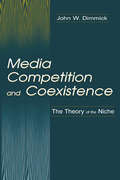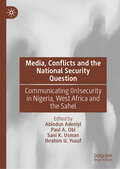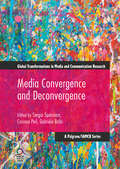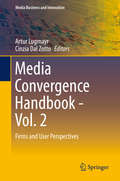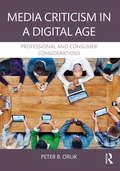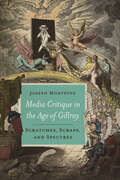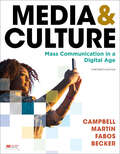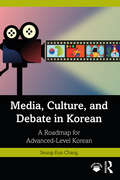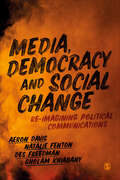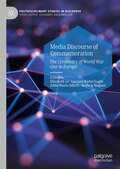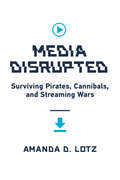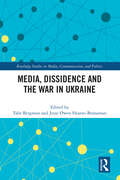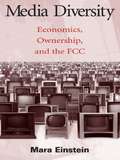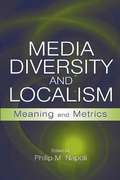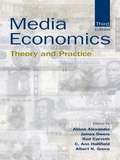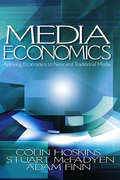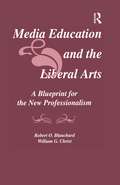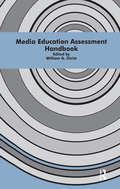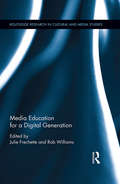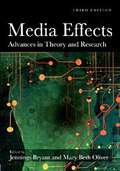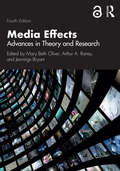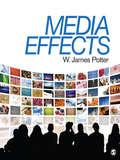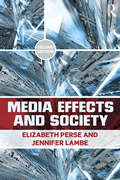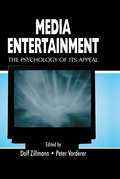- Table View
- List View
Media Competition and Coexistence: The Theory of the Niche (Routledge Communication Series)
by John W. DimmickThis volume considers how media firms, as well as entire industries, exist and persist over time despite what often seems to be intense competition for such resources as audiences and advertisers. Addressing competition within and among media organizations and industries, including broadcasting, cable, and the Internet, author John W. Dimmick studies the media industries through the niche theory lens, developed by bioecologists to explain competition and coexistence. He examines the targets of the different media--audience, advertisers, money--and how they compete, using examples from a variety of studies. Each chapter incorporates relevant economic constructs into the analytic framework. This approach includes the use of economics of scale to explain selection and firm mortality in newspapers and movie theaters; the application of the transaction costs concept to explicate the rise of advertising agencies; the employment of the strategic group concept in analyzing the niche breadth strategy; and the measurement of gratifications-utilities. A comprehensive overview of the determinants of media competition and coexistence, Media Competition and Coexistence: The Theory of the Niche offers unique insights for scholars, students, researchers, and practitioners in media economics, management, and business.
Media, Conflicts and the National Security Question: Communicating (In)security in Nigeria, West Africa and the Sahel
by Abiodun Adeniyi Paul A. Obi Sani K. Usman Ibrahim U. YusufThis book explores how the media, and journalism in a cross-disciplinary sense, has treated conflicts in Nigeria, West Africa and the Sahel. Contributors connect theoretical foundations with practical experiences in the study of media, conflicts and national security, seeking to unravel the mediated and communication logic(s) in news coverage and analyse the media's role in pre-conflict, in-conflict and post-conflict discourses. The work maps out the impact of mediated narratives on security, risk, terrorism, banditry and general society, relying on local, on-the-spot and ontological cultural experiences in Africa, especially Nigeria, Ghana, Sierra Leone and other parts of West Africa.
Media Convergence and Deconvergence (Global Transformations in Media and Communication Research - A Palgrave and IAMCR Series)
by Gabriele Balbi Corinna Peil Sergio SparvieroThis edited volume explores different meanings of media convergence and deconvergence, and reconsiders them in critical and innovative ways. Its parts provide together a broad picture of opposing trends and tensions in media convergence, by underlining the relevance of this powerful idea and emphasizing the misconceptions that it has generated. Sergio Sparviero, Corinna Peil, Gabriele Balbi and the other authors look into practices and realities of users in convergent media environments, ambiguities in the production and distribution of content, changes to the organization of media industries, the re-configuration of media markets, and the influence of policy and regulations. Primarily addressed to scholars and students in different fields of media and communication studies, Media Convergence and Deconvergence deconstructs taken-for-granted concepts and provides alternative and fresh analyses on one of the most popular topics in contemporary media culture.Chapter 1 is available open access under a CC BY 4.0 license at link.springer.com
Media Convergence Handbook - Vol. 1
by Cinzia Dal Zotto Artur LugmayrThe Media Convergence Handbook sheds new light on the complexity of media convergence and the related business challenges. Approaching the topic from a managerial, technological as well as end-consumer perspective, it acts as a reference book and educational resource in the field. Media convergence at business level may imply transforming business models and using multiplatform content production and distribution tools. However, it is shown that the implementation of convergence strategies can only succeed when expectations and aspirations of every actor involved are taken into account. Media consumers, content producers and managers face different challenges in the process of media convergence. Volume I of the Media Convergence Handbook encourages an active discourse on media convergence by introducing the concept through general perspective articles and addressing the real-world challenges of conversion in the publishing, broadcasting and social media sectors.
Media Criticism in a Digital Age: Professional And Consumer Considerations
by Peter B. OrlikMedia Criticism in a Digital Age introduces readers to a variety of critical approaches to audio and video discourse on radio, television and the Internet. It is intended for those preparing for electronic media careers as well as for anyone seeking to enhance their media literacy. This book takes the unequivocal view that the material heard and seen over digital media is worthy of serious consideration. Media Criticism in a Digital Age applies key aesthetic, sociological, philosophical, psychological, structural and economic principles to arrive at a comprehensive evaluation of programming and advertising content. It offers a rich blend of insights from both industry and academic authorities. These insights range from the observations of Plato and Aristotle to the research that motivates twenty-first century marketing and advertising. Key features of the book are comprised of: multiple video examples including commercials, cartoons and custom graphics to illustrate core critical concepts; chapters reflecting today’s media world, including coverage of broadband and social media issues; fifty perceptive critiques penned by a variety of widely respected media observers and; a supplementary website for professors that provides suggested exercises to accompany each chapter (www.routledge .com/cw/orlik) Media Criticism in a Digital Age equips emerging media professionals as well as perceptive consumers with the evaluative tools to maximize their media understanding and enjoyment.
Media Critique in the Age of Gillray: Scratches, Scraps, and Spectres
by Joseph MonteyneIn the late 1790s, British Prime Minister William Pitt created a crisis of representation when he pressured the British Parliament to relieve the Bank of England from its obligations to convert paper notes into coin. Paper quickly became associated with a form of limitless reproduction that threatened to dematerialize solid bodies and replace them with insubstantial shadows. Media Critique in the Age of Gillray centres on printed images and graphic satires which view paper as the foundation for the contemporary world. Through a focus on printed, visual imagery from practitioners such as James Gillray, William Blake, John Thomas Smith, and Henry Fuseli, the book addresses challenges posed by reproductive technologies to traditional concepts of subjective agency. Joseph Monteyne shows that the late eighteenth-century paper age’s baseless fabric set the stage for contemporary digital media’s weightless production. Engagingly written and abundantly illustrated, Media Critique in the Age of Gillray highlights the fact that graphic culture has been overlooked as an important sphere for the production of critical and self-reflective discourses around media transformations and the visual turn in British culture.
Media & Culture: An Introduction to Mass Communication
by Christopher Martin Ron Becker Richard Campbell Bettina FabosGet to the heart of fake news and brush up on your media literacy skills as you explore the media landscape of today, and where it all came from, using the current and relevant research found in Media & Culture.
Media, Culture, and Debate in Korean 미디어, 문화, 토론을 통한 고급 한국어 수업: A Roadmap for Advanced-Level Korean
by Seung-Eun ChangMedia, Culture, and Debate in Korean provides a roadmap for an advanced-level Korean course centered around media and culture and includes access to an archive of virtual media resources such as film, documentary, shows, newspaper, drama, music, and advertising. The book is designed to help students enhance their language skills and to deepen their knowledge and understanding of contemporary Korean society and culture through the analysis of authentic Korean media resources and debate. It addresses the cultural issues permeating Korean society that are rapidly transforming people’s perspectives, language, and lifestyle. These societal issues are discussed in the context of historical and psychological background, the struggle between tradition and changing values, positive and negative impact of the phenomenon, neologism, and potential solutions. This book can serve as a main textbook as well as a resource for an online class setting and can also be used in a traditional face-to-face class setting.
Media, Democracy and Social Change: Re-imagining Political Communications
by Des Freedman Aeron Davis Natalie Fenton Professor Gholam KhiabanyIn an age of &‘fake news&’ and Facebook algorithims, it can be tempting to see politics now as all mediation. But there&’s more to Trump than Twitter. This much-needed text puts politics back into political communications, refocusing on on the broader context of neoliberal capitalism that remains essential for understanding what political communications is, and can hope to be. We have to engage with democracy and capitalism, not just the digital ecology of social media, because focusing on the communicative can risk downgrading the political. Focusing on broad themes of structural inequality, technological change, political realignment and social transformation, Fenton and Davis explore political communications as it relates to debates around the state, infrastructures, elites, populism, political parties, activism and social movements, the legacies of colonialism, and more. This book provides both an expert introduction to the field of political communications, and a critical intervention to help re-imagine what a democratic politics might mean in a digital age, and a result it serves as essential reading for students, researchers and activists across both media and communication studies and politics.
Media, Democracy and Social Change: Re-imagining Political Communications
by Des Freedman Aeron Davis Natalie Fenton Professor Gholam KhiabanyIn an age of &‘fake news&’ and Facebook algorithims, it can be tempting to see politics now as all mediation. But there&’s more to Trump than Twitter. This much-needed text puts politics back into political communications, refocusing on on the broader context of neoliberal capitalism that remains essential for understanding what political communications is, and can hope to be. We have to engage with democracy and capitalism, not just the digital ecology of social media, because focusing on the communicative can risk downgrading the political. Focusing on broad themes of structural inequality, technological change, political realignment and social transformation, Fenton and Davis explore political communications as it relates to debates around the state, infrastructures, elites, populism, political parties, activism and social movements, the legacies of colonialism, and more. This book provides both an expert introduction to the field of political communications, and a critical intervention to help re-imagine what a democratic politics might mean in a digital age, and a result it serves as essential reading for students, researchers and activists across both media and communication studies and politics.
Media Discourse of Commemoration: The Centenary of World War One in Europe (Postdisciplinary Studies in Discourse)
by Hedwig Wagner Elisabeth Le Luciana Radut-Gaghi Alida Maria SillettiThis book explores how First World War commemoration events are presented, reported and mediated on the websites of mainstream daily newspapers from seven European countries. The book is the result of a research group – DIREPA-EUROPE (Discours, représentations, passé de l’Europe), part of Lemel research network – characterized by a shared interest in media discourse and online newspapers. It presents a fluid analysis chain on the commemoration discourse generated by the WWI Armistice Centenary in 2018, and will be of interest not only to scholars of discourse and media studies, but also of European history, cultural memory, journalism and conflict studies.
Media Disrupted: Surviving Pirates, Cannibals, and Streaming Wars
by Amanda D. LotzHow the internet disrupted the recorded music, newspaper, film, and television industries and what this tells us about surviving technological disruption.Much of what we think we know about how the internet "disrupted" media industries is wrong. Piracy did not wreck the recording industry, Netflix isn't killing Hollywood movies, and information does not want to be free. In Media Disrupted, Amanda Lotz looks at what really happened when the recorded music, newspaper, film, and television industries were the ground zero of digital disruption. It's not that digital technologies introduced "new media," Lotz explains; rather, they offered existing media new tools for reaching people. For example, the MP3 unbundled recorded music; as the internet enabled new ways for people to experience and pay for music, the primary source of revenue for the recorded music industry shifted from selling music to licensing it. Cable television providers, written off as predigital dinosaurs, became the dominant internet service providers. News organizations struggled to remake businesses in the face of steep declines in advertiser spending, while the film industry split its business among movies that compelled people to go to theaters and others that are better suited for streaming. Lotz looks in detail at how and why internet distribution disrupted each industry. The stories of business transformation she tells offer lessons for surviving and even thriving in the face of epoch-making technological change.
Media, Dissidence and the War in Ukraine (Routledge Studies in Media, Communication, and Politics)
by Tabe Bergman Hearns-Branaman, Jesse OwenThis volume examines the global media coverage of the armed conflict in Ukraine, focusing on the marginalization of dissident perspectives in the West and the information quality and diversity on social media.Along with presenting original, empirical studies on how mainstream media in countries as diverse as Israel, the Czech Republic, Ghana, and the Netherlands have covered the conflict between NATO and Russia since 2022, this book sheds light on the role of the state and the media in policing the boundaries of permissible thought on the conflict in the West, as well as in Russia and Ukraine. It also delves into the war’s representation on prominent social media platforms.Written by a diverse group of international researchers, this multifaceted volume offers new perspectives and insights on the reporting of the ongoing conflict. It will interest scholars of international communication and media, foreign policy and international politics, war and conflict, content analysis, and journalism.
Media Diversity: Economics, Ownership, and the Fcc (Routledge Communication Series)
by Mara EinsteinMedia Diversity: Economics, Ownership, and the FCC provides a detailed analysis of the regulation of diversity and its impact on the structure and practices within the broadcast television industry. As deregulation is quickly changing the media landscape, this volume puts the changing structure of the industry into perspective through the use of an insider's point of view to examine how policy and programming get made. Author Mara Einstein blends her industry experience and academic expertise to examine diversity as a media policy, suggesting that it has been ineffective and is potentially outdated, as study after study has found diversity regulations to be wanting. In addition to reviewing diversity research on the impact of minority ownership, regulation of cable and DBS, duopolies, ownership of multiple networks and cross ownership of media on program content, Einstein considers the financial interest and syndication rules as a case study, due to their profound effects on the structure of the television industry. She also poses questions from an economic perspective on why the FCC regulates structure rather than content. Through the presentation of her research results, she argues persuasively that the consolidation of the media industry does not affect the diversity of entertainment programming, a conclusion with broad ramifications for all media and for future research about media monopolies. This volume serves as a defining work in its examination of the intersection of regulation and economics with media content. It is appropriate as a supplemental text in courses on communication policy, broadcast economic and media management, broadcast programming, political economy of the mass media, and media criticism at the advanced and graduate level. It is also likely to interest broadcast professionals, media policymakers, communication lawyers, and academics. It is a must-read for all who are interested in the media monopoly debate.
Media Diversity and Localism: Meaning and Metrics (Routledge Communication Series)
by Philip M. NapoliQuestions concerning the quality of media performance and the effectiveness of media policymaking often revolve around the extent to which the media system fulfills the values inherent in diversity and localism principles. This edited volume addresses challenges and issues relating to diversity in local media markets from a media law and policy perspective. Editor Philip M. Napoli provides a conceptual and empirical framework for assessing the success/failure of media markets and media outlets in fulfilling diversity and localism objectives. Featuring well-known contributors from a variety of disciplines, including media, law, political science, and economics, Media Diversity and Localism explores the following topics:*media ownership and media diversity and localism;*conceptual and methodological issues in assessing media diversity and localism;*minorities, media, and diversity; and*contextualizing media diversity and localism: audience behavior and new technologies. This substantive and timely volume speaks to scholars and researchers in the areas of media law and policy, political science, and all others interested in media regulation. It can also be used in a graduate seminar on media policy topics.
Media Economics: Theory and Practice (Routledge Communication Series)
by Alison Alexander James Owers Rod Carveth C. Ann Hollifield Albert N. GrecoMedia Economics: Theory and Practice focuses on the basic principles of economics in the business sector and applies them to contemporary media industries. This text examines the process of media economics decision making through an exploration of key topics, such as industrial restructuring, regulatory constraints upon media operations, and changing economic value, providing key insights into media business activities. With the structure and value of media industries changing rapidly and sometimes dramatically, this text moves beyond a basic documentation of historical patterns to help readers understand the mechanics of change, offering insight into the processes reproducing contemporary trends in media economics. Thoroughly updated in this third edition, Media Economics focuses on the primary concerns of media economics, the techniques of economic and business analysis, and the overall characteristics of the media environment; and explores contemporary business practices within specific media industries, including newspaper, magazine, television, cable, movie, radio advertising, music, and online industries. New for this edition are chapters on the advertising, book publishing, and magazine publishing industries. Chapters contributed by expert scholars and researchers provide substantial discussions of the crucial topics and issues in the media industry sectors, and emphasize both domestic and international businesses. Offering a thorough examination of the economic factors and forces concerning the media industries, Media Economics is appropriate for use as a course text for advanced media management and economics students. It also serves as an indispensable reference for scholars and researchers in media business arenas.
Media Economics: Applying Economics to New and Traditional Media
by Dr Colin Hoskins Dr Stuart M. McFadyen Dr Adam FinnMedia Economics: Applying Economics to New and Traditional Media differs from ordinary media economic texts by taking a conceptual approach to economic issues. As the book progresses through economic principles, authors Colin Hoskins, Stuart McFadyen, and Adam Finn use cases and examples to demonstrate how these principles can be used to analyze media issues and problems. Media Economics emphasizes economic concepts that have distinct application within media industries, including corporate media strategies and mergers, public policy within media industries, how industry structure and changing technologies affect the conduct and performance of media industries, and why the United States dominates trade in information and entertainment.
Media Education and the Liberal Arts: A Blueprint for the New Professionalism (Routledge Communication Series)
by Robert O. Blanchard William G. ChristThis book provides academic reformers with a blueprint for tackling the upheaval facing media education. It calls for a new professionalism that rejects the status quo, reflects the mission and diversity of individual programs, and demands a redefinition of both traditional media studies and the liberal arts. The book directs philosophical assaults and uses real-life examples to challenge the paralyzing effects of the "seven deadly sins" of media education.
Media Education Assessment Handbook: A Resource Handbook For Educators And Administrators: Component 3: Developing An Assessment Plan (Routledge Communication Series)
by William G. ChristAssessing media education is a formidable task because both assessment and media education are complex and controversial concepts. Assessment, which can take place at the individual student, class, sequence, program, department or unit, and university levels, is questioned in terms of reliability, validity, relevance, and cost. Media education, which has been challenged at a number of schools, finds faculty and administrators in the midst of soul-searching about how to clearly articulate its missions and purposes to a broader audience. Departments are under increasing national, state, and institutional pressure to get assessment procedures carried out quickly, but there is an obvious danger in rushing to implement assessment strategies before establishing what is essential in media education. In communication education in general, the "what" of assessment is often discussed in terms of skills, attitudes, affect, values, and knowledge. People assess students to determine what they know, think, feel, value, and can do. Here it is suggested that one of the places to start defining what students should learn from their media education is by identifying outcomes. Outcomes can be assessed in a variety of ways, but first they need to be developed and clearly articulated.
Media Education for a Digital Generation (Routledge Research in Cultural and Media Studies)
by Julie Frechette Rob WilliamsMedia education for digital citizenship is predicated upon the ability to access, analyze, evaluate and produce media content and communication in a variety of forms. While many media literacy approaches overemphasize the end-goal of accessing digital media content through the acquisition of various technology, software, apps and analytics, this book argues that the goals for comprehensive and critical digital literacy require grasping the means through which communication is created, deployed, used, and shared, regardless of which tools or platforms are used for meaning making and social interaction. Drawing upon the intersecting matrices of digital literacy and media literacy, the volume provides a framework for developing critical digital literacies by exploring the necessary skills and competencies for engaging students as citizens of the digital world.
Media Effects
by Jennings Bryant Mary Beth OliverWith contributions from some of the finest scholars in the discipline, Media Effects serves not only as a comprehensive reference volume for media effects study but also as an exceptional textbook for advanced courses in media effects. Covering the breadth of the media effects arena, this third edition provides updated material as well as new chapters focusing on effects of mobile media and other technologies. As this area of study continues to evolve, Media Effects will serve as a benchmark of theory and research for current and future generations of scholars.
Media Effects: Advances in Theory and Research (Routledge Communication Series)
by Jennings Bryant Mary Beth Oliver Arthur A. RaneyNow in its fourth edition, Media Effects again features essays from some of the finest scholars in the field and serves as a comprehensive reference volume for scholars, teachers, and students. This edition contains both new and updated content that reflects our media-saturated environments, including chapters on social media, video games, mobile communication, and virtual technologies. In recognition of the multitude of research trajectories within media effects, this edition also includes new chapters on narratives, positive media, the self and identity, media selection, and cross-cultural media effects. As scholarship in media effects continues to evolve and expand, Media Effects serves as a benchmark of theory and research for the current and future generations of scholars. The book is ideal for scholars and for undergraduate and graduate courses in media effects, media psychology, media theory, psychology, sociology, political science, and related disciplines.
Media Effects
by W. James PotterMedia Effects provides students with an in-depth understanding of how the media are constantly influencing individuals and society. W. James Potter guides readers through the extensive body of research on the effects of the mass media by organizing the book around two Media Effects Templates. The first template helps organize thinking about media influences on individuals, and the second focuses on media influences on larger social structures and institutions. Throughout the book, Potter encourages students to analyze their own experiences tby searching for evidence of these effects in their own lives, making the content meaningful.
Media Effects and Society (Routledge Communication Series)
by Elizabeth M. Perse Jennifer LambeGrounded in theoretical principle, Media Effects and Society help students make the connection between mass media and the impact it has on society as a whole. The text also explores how the relationship individuals have with media is created, therefore helping them alleviate its harmful effects and enhance the positive ones. The range of media effects addressed herein includes news diffusion, learning from the mass media, socialization of children and adolescents, influences on public opinion and voting, and violent and sexually explicit media content. The text examines relevant research done in these areas and discusses it in a thorough and accessible manner. It also presents a variety of theoretical approaches to understanding media effects, including psychological and content-based theories. In addition, it demonstrates how theories can guide future research into the effects of newer mass communication technologies. The second edition includes a new chapter on effects of entertainment, as well as text boxes with examples for each chapter, discussion of new technology effects integrated throughout the chapters, expanded pedagogy, and updates to the theory and research in the text. These features enhance the already in-depth analysis Media Effects and Society provides.
Media Entertainment: The Psychology of Its Appeal (Routledge Communication Series)
by Dolf Zillmann Peter VordererThis collection represents a systematic exploration of media entertainment from an academic perspective. Editors Zillmann and Vorderer have assembled scholars from psychology, sociology, and communication to provide a broad examination of the primary function of media entertainment--the attainment of gratification. Chapters included here address vital aspects of media entertainment and summarize pertinent findings, providing an overview of what is presently known about the appeal and function of the essential forms of media entertainment, and offering some degree of integration. Written in a clear, non-technical style, this volume provides a lively and entertaining study of media entertainment for academic study and coursework.
